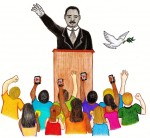Martin Luther King Jr. Day honors Dr. King and his lasting efforts in America. It is a time to reflect on our historical advancements, but also to acknowledge that inequalities still exist today. Scholars and students alike agree that although Dr. King has elevated us, progress is an ongoing effort.
—-
TRANSCRIPT:
SMITH: Martin Luther King Jr. Day granted time to commemorate Dr. King’s birthday and all he did during the Civil Rights Movement in the 1960s from implementing nonviolent civil disobedience, to being a key leader in the passing of the Civil Rights Act of 1964, which outlawed discrimination by race, color, nationality, sex and religion. From the recent discovery of an audio recording of King’s speech in a storage room at UCLA, to the movie released this year, Selma,entailing the marches leading to the Voting Rights Act of 1965, the legacy of the activism of Martin Luther King Jr. and other civil rights leaders is still prominent. But have we achieved Dr.King’s dream of social and racial equality?
GREEN: This is a question that we’ve had to grapple with- Are we living the dream? And you know, my answer is no, we’re not.
SMITH: That was Gary Green, Assistant to the Dean of Social Sciences. Green shares the sentiment that King’s legacy can be seen in present day America; however, King’s visions have not been fully carried out today. Green says there is still significant room for improvement in America today.
GREEN: You know it’s important to think about what happened after that and how did we get here now. It goes a step further to say, “Now what can we do about this?” You know, let’s not just observe it, let’s see what we’re looking at, put it into action, and then study our results, and modify that and keep moving.
SMITH: Cheryl Harris, professor of law and the Rosalinde and Arthur Gilbert Foundation Chair in Civil Rights and Civil Liberties at UCLA School of Law, co-organized a symposium preceding the holiday exploring racial and social inequalities in America today.
HARRIS: There are certain things that have changed, but there are certain patterns, which are historical and keep recurring which tells us that the cancer we are addressing is still there.
SMITH: Although we may have a long way to go, there is no doubt that Dr. King’s contributions to the Civil Rights Movement changed the nation. Third-year communication studies student Garet Abrams, also in attendance at the symposium, shares his thoughts on these impacts.
ABRAMS: He instilled hope into my people because he took a group that at the time felt that there was no hope, and he instilled hope in them and he added that with perseverance and unity, and by those means, he was able to achieve his goals, and I think those ideals and values are good for anybody, not just people of color.
SMITH: With the greatness achieved through Martin Luther King Jr.’s efforts, our acknowledgements go further than the holiday alone.
HARRIS: It would never be enough for anyone who is as committed as King was to think that a day of commemoration is sufficient to alleviate the kind of suffering that he and others gave their lives to try to address.
SMITH: With Martin Luther King Jr. Day passing, we take the time to honor a man who is considered by many to be a key catalyst of American progression toward racial equality. His legacy goes beyond the holiday we have to commemorate him, but highlights the progress that America has made so far, and the promise of progress that the American people can make in the future.
HARRIS: If one studies Martin Luther King Jr. and his work, he really understood that the struggle for liberation was a process and not an endpoint.
SMITH: For Daily Bruin Radio, this is Milan Smith.

Do students, faculty, administrators, medical professionals, and management realize that UCLA is now recognized as the most racist college in the nation?
What happened to Dr. Christian Head was one of the biggest racists acts I have heard of in Los Angeles. All who witnessed this racist act against a Black physician did nothing. That says that there is something profoundly bankrupt in the students and instructors at the School of Medicine.
Sexual harassment and racism of this nature are brand busting. And neither Dr. David T. Feinberg nor Chansellor Gene Block have removed the racists responsible. Guess they’re waiting for a cross burning or a lynching on campus to do something.
Then you have the local eugenics proponents who want to exclude Blacks, and then scapegoat the one or two Black students as a way of protesting their complaints of racism. Guess they showed everybody that the complaints were legitimate. I think that employers should beware of UCLA graduates, they seem to be a very racist lot.
What type of American would presume to be an educator or a leader, and not have a single Black acquaintance? Answer: A UCLA employee. I will not hire any at my studio. No actors, nobody from UCLA.
UCLA needs to be shut down until all employees are educated, and the management completely removed.